
World
17:08, 02-Jan-2019
2018 Reporters' look back: Amazing people I met in Africa
Updated
16:53, 05-Jan-2019
By Yang Chengxi
05:39
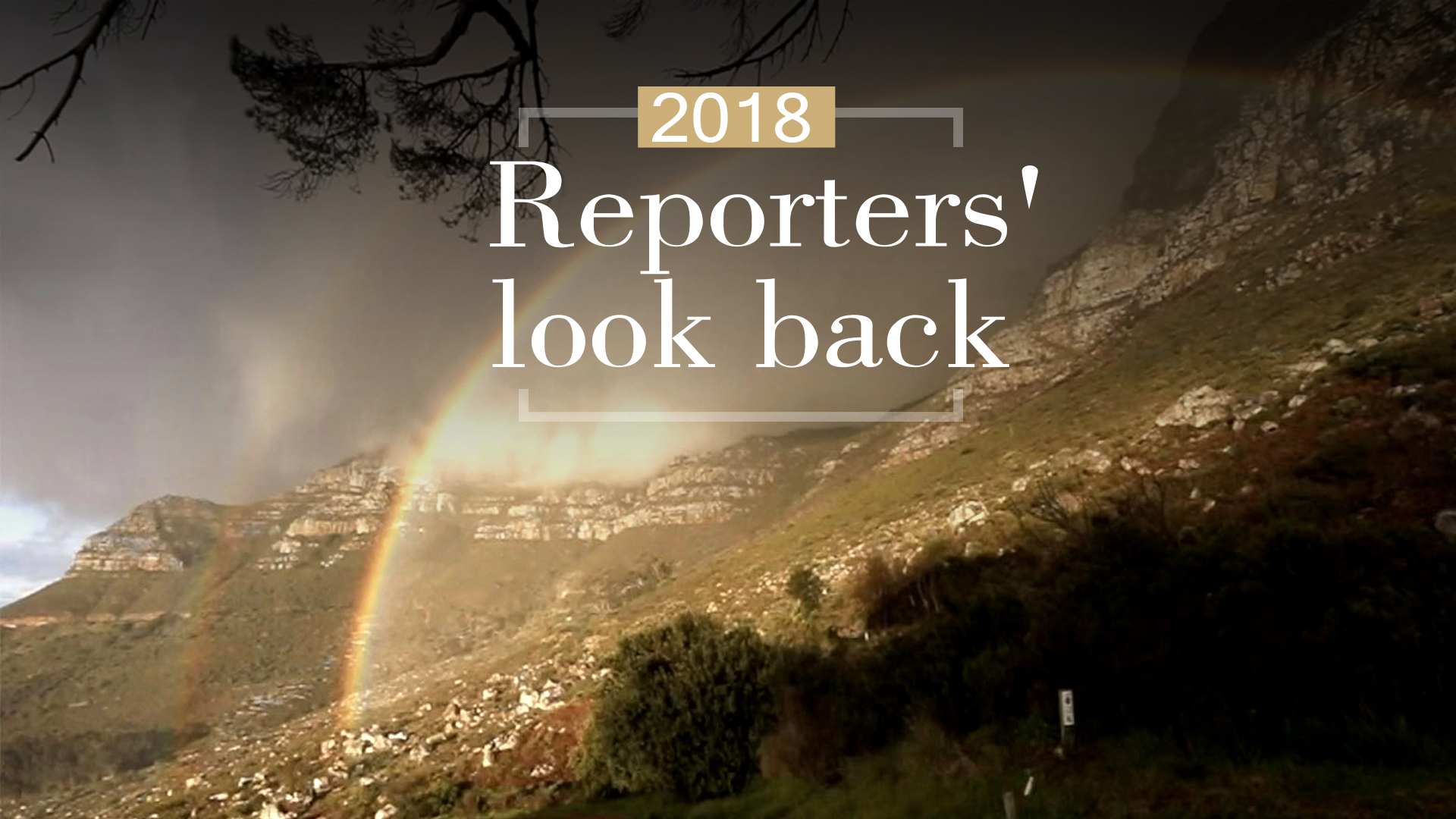
Five months ago, I would have never thought that I could "touch nose" with an African elephant...Let me tell you about my journey in Africa.
Even though most of our Chinese reporters at CGTN are based on the Chinese mainland, the African continent has never been a distant concept for us. CGTN has an African bureau in Nairobi, Kenya – it has a group of very competent African reporters and anchors, and is one of the few global TV stations with a strong focus on the development of African economies.
Several colleagues in the Beijing bureau have had the chance to go on trips across Africa, reporting on infrastructure, culture and people's livelihoods. Luckily, I became one of them last year when I was assigned a reporting trip to South Africa, Kenya and Zimbabwe in August.
I was both thrilled and nervous, because I needed to make this trip of a lifetime count. Of course, I could do a quick search on the Internet for major Chinese joint infrastructure projects under the Belt and Road Initiative, as there are quite a lot of them. But the real challenge was to find locals with stories to tell, particularly those who could share facets of China-Africa cooperation that's beyond what's on the web.
This article is dedicated to all the wonderful people I met during the 10-day trip.
When we landed in Cape Town, Adam was there to pick us up. He was our trusty local companion who was kind enough to show us around the beautiful city of Cape Town on our first day there.
He taught us a cool South African English slang: "bru." It basically means bro, but it sounds similar to the Afrikaans word for bro: broer. Afrikaans is the daughter language of Dutch and was invented by early European settlers in South Africa.
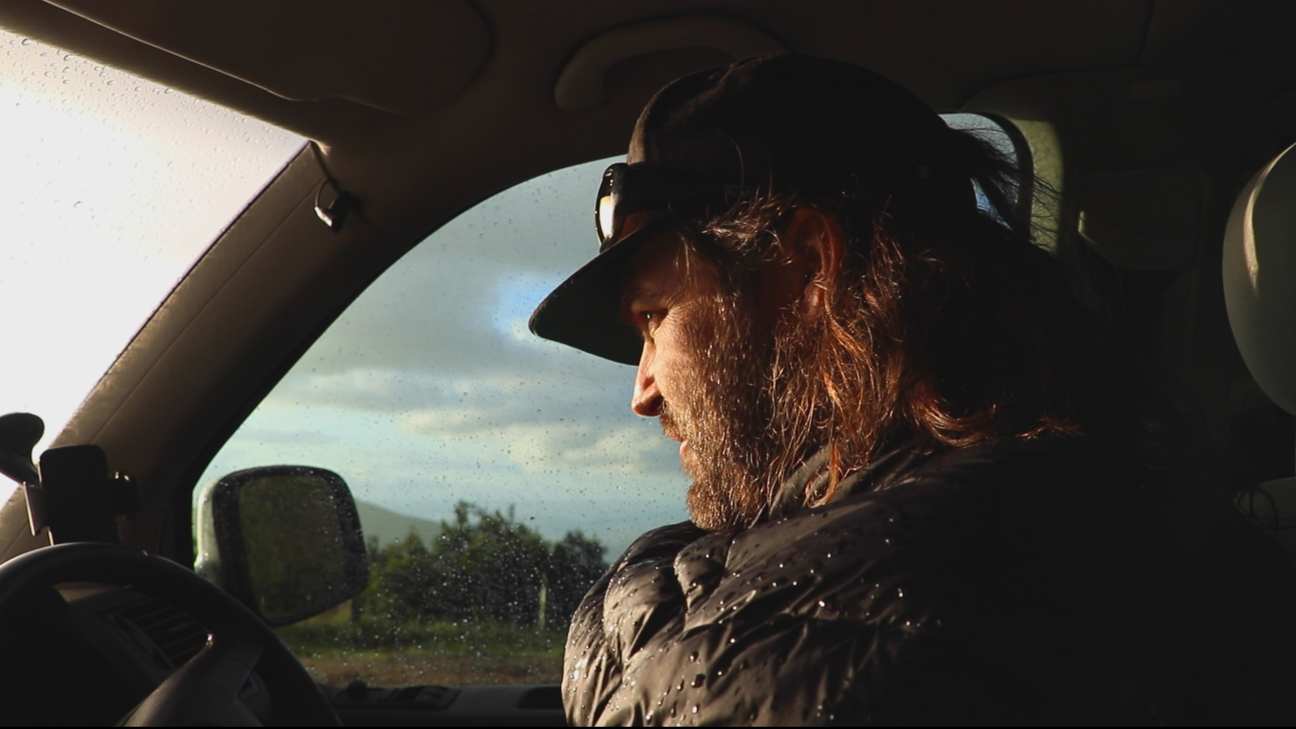
Adam, our "bru" in Cape Town. /CGTN Photo
Adam, our "bru" in Cape Town. /CGTN Photo
When I visited a local factory, I got a taste of "the bru way." People in South Africa are amazingly friendly. Whenever I passed by a worker, we would nod or wave hello: something that would feel a bit awkward in Oriental culture.
After spending two days in Cape Town, we left for Johannesburg, the largest city in South Africa, to visit one of their townships called Tembisa. Townships are informal settlements mostly inhabited by people of African origin.
During the apartheid era, people of African origin were evicted from properties that were in areas designated as "white only" and forced to move into these segregated areas.
We hired a local guide to accompany us, partly out of safety concerns as we'd read about many reports of crime in downtown Johannesburg.
Our guide was Paul. He was very talkative and started a long conversation as we drove to Tembisa.
What's the top icebreaker when talking with a Chinese? Yes, kung fu. I had to explain to him that martial arts are not a compulsory course in Chinese schools. "Oh, what a shame," he said jokingly.
He later went into a series of other topics. When he heard that we were here as part of our channel's coverage on the Belt and Road Initiative, he expressed his opinions on the role of China in Africa.
"Give someone a fish and you feed him for a day; teach someone how to fish and you feed him for life, yes?" He said China has been developing very quickly, and he hoped Africa can learn the know-how to do the same.
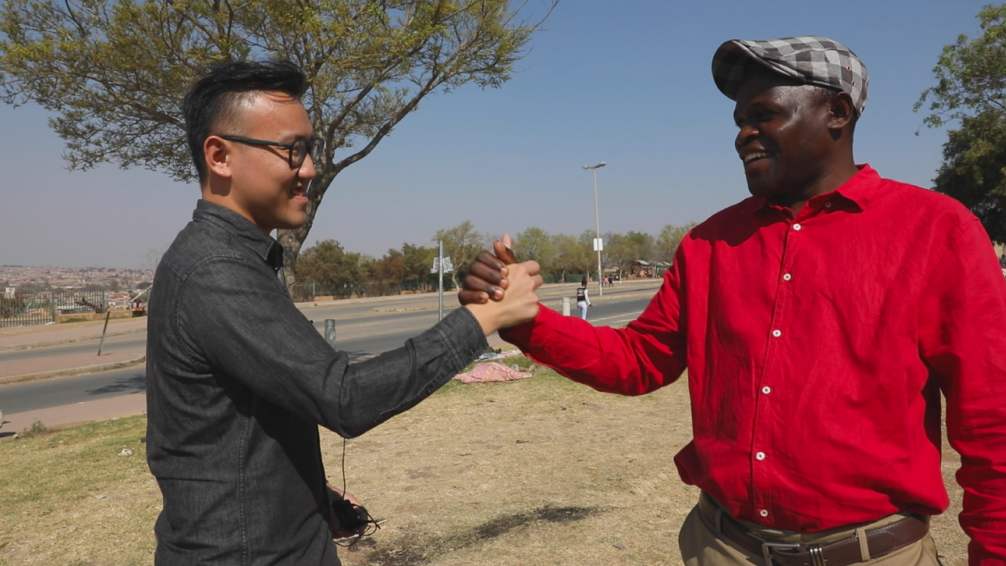
Paul teaches CGTN reporter Yang Chengxi the African handshake. /CGTN Photo
Paul teaches CGTN reporter Yang Chengxi the African handshake. /CGTN Photo
We then arrived in Tembisa, a 42-square-kilometer low-income section of Johannesburg with more than 460,000 people.
We were there to report on how a Chinese company called Startimes is breaking into the monopolistic TV market in South Africa.
At the 2015 Forum on China-Africa Cooperation, China pledged to bring satellite TV to 10,000 African villages. Startimes is one company carrying out that mission effectively.
We met Patrick, who has lived in the area all his life. He showed us around his home, which is essentially a big box made out of iron sheets. It houses him, his wife and his daughter.
The living conditions were the same for the majority of families in Tembisa. I saw something in that house that struck a chord in my heart. As crammed as the walls are, they managed to hang a big picture frame that contained several photos of the daughter's graduation.
The family members were dressed in gowns and gleaming with smiles. I know that smile: it was the same smile that my family had when they came to my graduation. It must have been one of the proudest moments in Patrick's life. As different as our lives are, we have aspirations that are so similar.
After Johannesburg, we left for our second destination country: Kenya. But we didn't stay in a big city like Nairobi or Mombasa. We went straight to Masai Mara.
Our local guide Willy came to pick us up at the airport. He is one year younger than I and he grew up as a member of the local Masai clan. These people have a distinct way of life that is well preserved in the modern era, as well as amazing knowledge about wildlife; Willy even knew some of the animals we drove by their given names.
He told me "nihao," which is the Chinese phrase for hello, is also a greeting word in the local Swahili language. Next time you're in Masai Mara, feel free to say Nihao!
We were there to interview Alfred Bett, the tourism warden of the Masai Mara National Reserve. He leads the many rangers in the park, who are tasked with protecting wild animals in the Masai Mara National Reserve, especially those magnificent beasts: the elephants.
Over 100,000 elephants have been slaughtered in the past three years for their ivory, and protecting them can be a dangerous job.
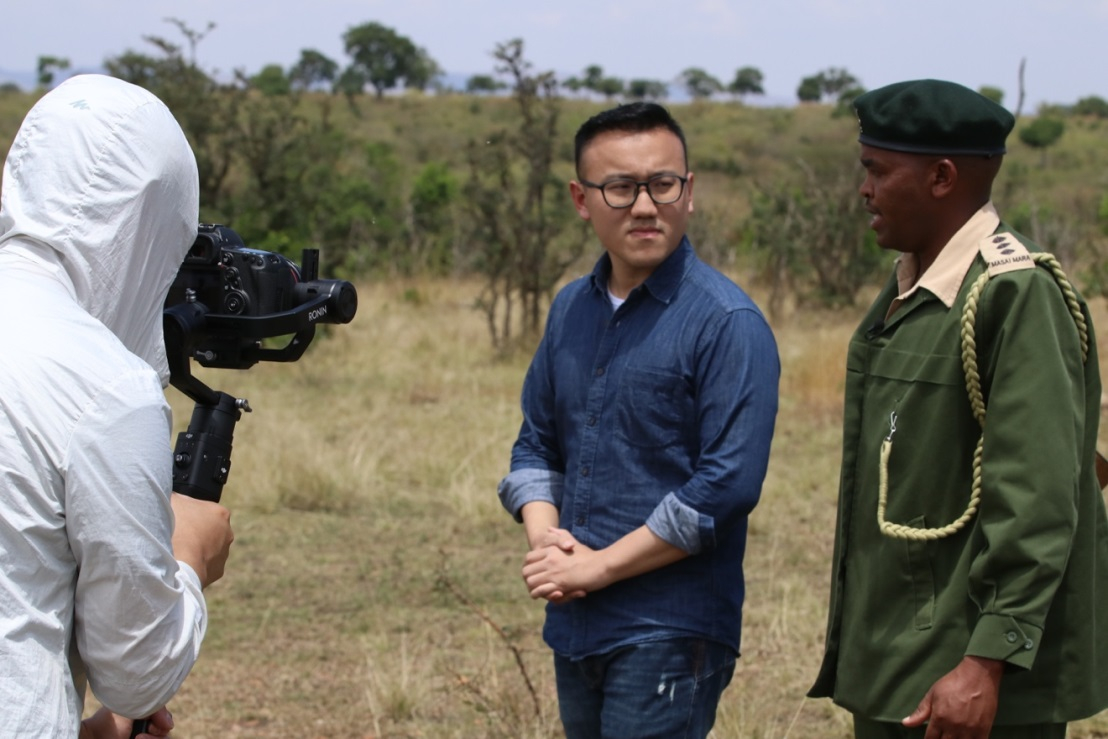
Alfred Bett talks to CGTN. /CGTN Photo
Alfred Bett talks to CGTN. /CGTN Photo
According to a 2016 report, 82 percent of rangers in Africa have faced life-threatening situations while on duty. About 60 percent have been attacked by poachers.
Bett has worked at the reserve for 14 years. He said they also need to watch out for animals like buffaloes, which have a habit of ambushing humans.
"We are not allowed to shoot the animals. The first priority is to shoot in the air, and you make sure you run away even if it's a buffalo. You are supposed to climb on a tree; that's how you get safe from the buffalo," he said.
When we finished our interview, Bett said: "Yang, I know you have the power to spread the news about elephant protection in China. Please raise people's awareness on this issue; we would be most grateful."
When I came back to China, I did an elephant protection story which was one of the most elaborate feature stories I have done.
By banning ivory sales in 2017, China has seen a big turnaround in its role in the global ivory trade. The decision will hopefully diminish the market and discourage poaching.
One major consequence of poaching is the trade in elephant orphans. There is one NGO that's dedicated to saving these helpless creatures in Zimbabwe, our last stop in Africa.
We met Roxy Danckwerts, the founder of the Zimbabwe Elephant Nursery in Harare. She has dedicated her life to saving orphaned elephants.
At the nursery, I met Moyo, who was rescued at three-to-four days old. Today, she is healthy, playful, and has become a kind of ambassador for the nursery because she is incredibly friendly. One game she liked to play is blowing air into people's faces. Despite her size, she is a little kid at heart.
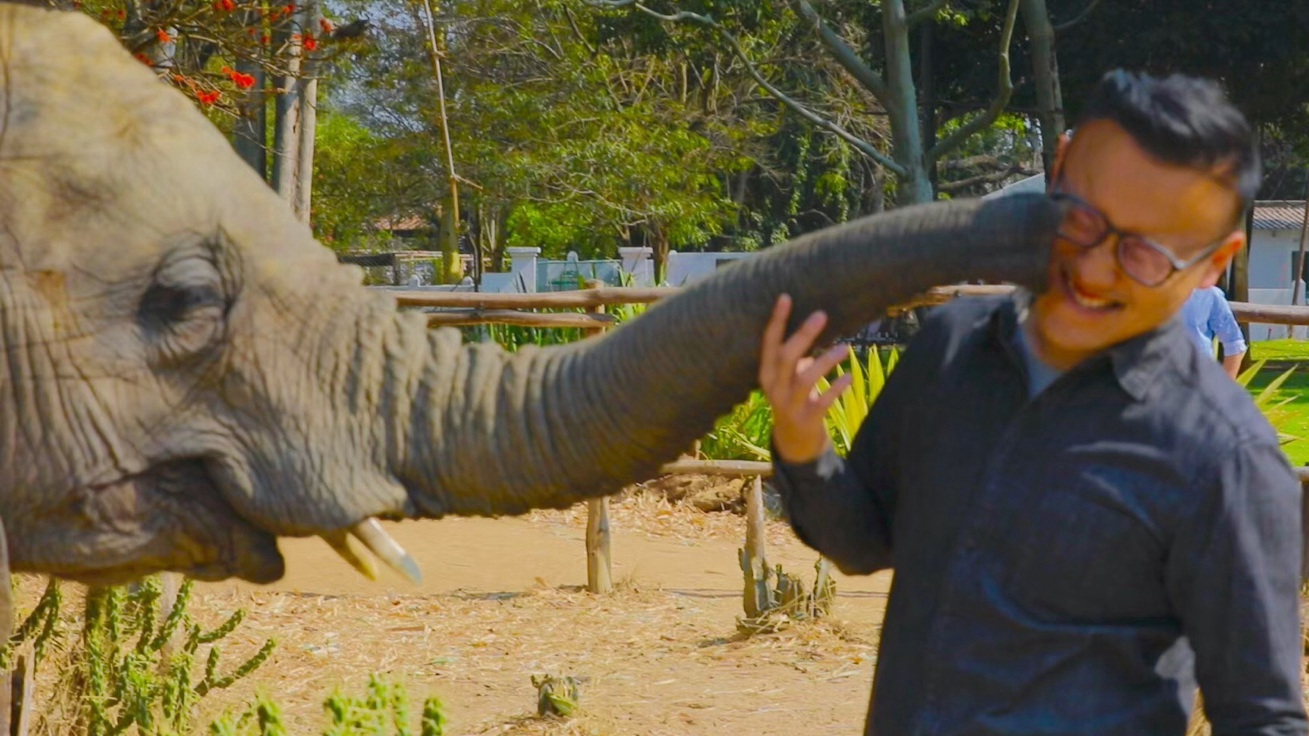
Moyo is very tactile. /CGTN Photo
Moyo is very tactile. /CGTN Photo
She recounted the time when Chinese President Xi Jinping came to visit Moyo. "The president just loved animals, and he just had this wonderful smile on his face. He was really excited to meet Moyo. He was really concerned about the ivory problem. Banning the domestic ivory trade in China was a huge step," she said.
Danckwerts also recounted her experiences in saving elephants, including the time she became really sick by taking care of two cubs which were victims of cyanide poisoning by poachers.
Unfortunately, the elephants did not make it. We had a big hug as I left.
These are the people I met in Africa. I got what I was there for. It was indeed a time of my life.
More CGTN reporters' look back:

SITEMAP
Copyright © 2018 CGTN. Beijing ICP prepared NO.16065310-3
Copyright © 2018 CGTN. Beijing ICP prepared NO.16065310-3